817 Search Results for praactical teaching
November 15, 2012
by Robin Parker -
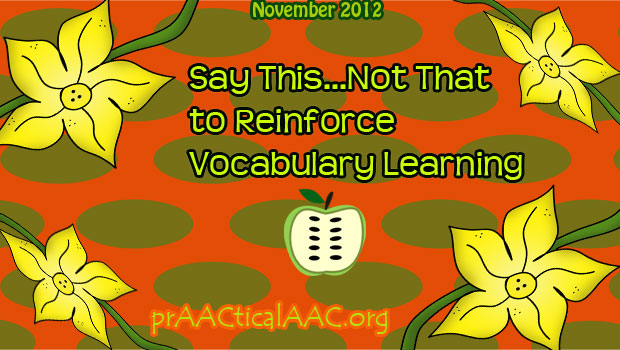
Part of TEACHING vocabulary to AAC users (or any learner) involves reinforcement. Reinforcement is more than just facilitating positive self esteem. It is also about providing feedback that will help increase the skill you are trying to teach. It’s even more than learning specific new words but also about strategies to attack learning new words outside of the therapy or classroom environment. Below are some examples of ways to make the most of your reinforcement and some ways to NOT. 🙂 SAY THIS… General Principles of Reinforcement for Vocabulary: Be specific to the goal. Use words that explain the skill you want to occur more often. Use excited positive vocal inflection, Be impressed! We are continuing with the example of teaching the word consumed from Carole’s post on Monday, What Makes A Good Vocabulary Teaching Activity. ‘Wow you discovered a NEW WAY of saying take in, you used consumed’! ‘Awesome... [Read More...]
November 10, 2012
by Robin Parker -
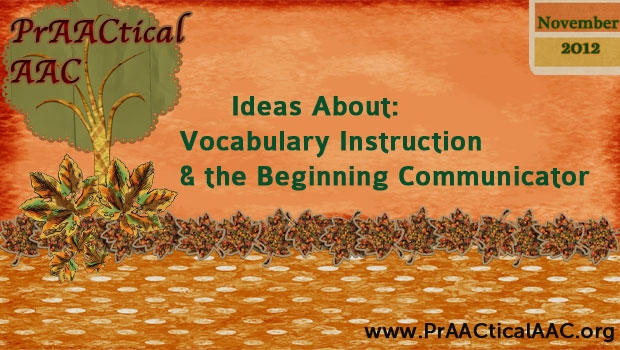
Vocabulary instruction is a topic not often discussed for beginning communicators. As we work with beginning communicators the primary focus is often vocabulary selection for communication displays. This is understandable as the beginning communicator has many needs, but that is no excuse for leaving out vocabulary instruction. Direct vocabulary instruction helps expand broader vocabulary selection options, literacy skills, and world knowledge. With that in mind, see below for vocabulary instruction philosophies, notes, and activities for the beginning communicator. Please let us know about your favorite vocabulary instruction activities. Vocabulary Instruction for the Beginning Communicator: 5 Philosophies Vocabulary instruction involves a systematic TEACHING process. Add vocabulary as an activity on the daily schedule and then have a mini-schedule for the specific vocabulary instruction activities for that day. Carole introduced general steps for vocabulary instruction last week. For the beginning communicator, also apply an errorless learning paradigm. Gradually, add comprehension checks, but... [Read More...]
November 3, 2012
by Carole Zangari -
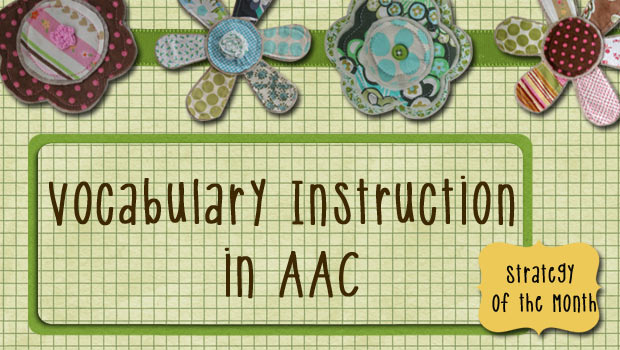
For all of us, the process of how we learn to use words begins with the expression of our own intents. Initially, we use words, pictures, or signs to make our wants/needs known but that soon develops into social exchanges, true conversations, stories, and more. For some of our AAC friends, the path to a rich lexicon can be convoluted and bumpy. Our November Strategy of the Month posts will focus on vocabulary instruction giving both general principles that should guide our teaching and specific considerations for communicators at different levels. As SLPs, we should be champions for a comprehensive approach to semantic instruction in AAC. Much of what we already know for teaching semantics to people who speak can be applied quite nicely to individuals with AAC needs. Certainly some things will need to be adapted, but that’s not the real issue. We’ve noticed that SLPs sometimes forget to... [Read More...]
October 29, 2012
by Carole Zangari -
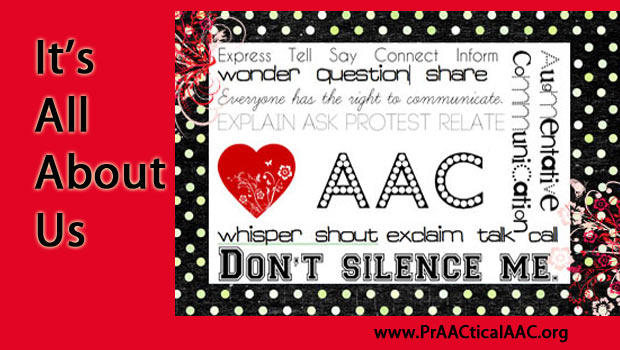
No one wants to be ‘that’ professional. You know him or her. The one who always sees the glass as half empty. The one who can give you a long list of things his/her clients can’t do, won’t be able to do. The one is quick to give a dozen reasons why the AAC tools and strategies won’t work for his/her clients. The one who repeatedly says “We tried that and it didn’t work.” I met a professional like this (haven’t we all??) at a workshop I was teaching on making AAC work in the classroom. She approached me at every break and was eager to talk. In these conversations she tried everything she could to get me to agree that her kids were “too low functioning,” that the AAC device was too high level for them, and that the parent’s expectations were unrealistic. What struck me about this young... [Read More...]
October 27, 2012
by Robin Parker -
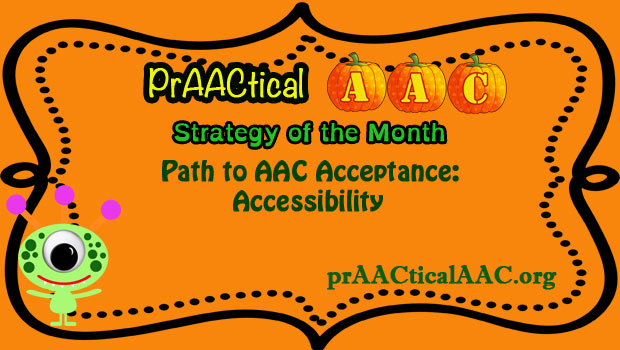
It is AAC Awareness Month and everyone has really been spreading the word and helping to build AAC acceptance. Participation barriers continue to prevent full AAC acceptance. In order to help combat these obstacles it is necessary to talk about them, deconstruct them, and attempt to build solutions. So after going over attitudinal barriers and information barriers, we need to discuss accessibility barriers. It’s a shame that there are so many barriers to making AAC work, but we know that with awareness comes improvement. Barriers of accessibility can be about motor, sensory, cognitive, literacy, or communication/language issues. For this discussion though the focus is on accessing AAC to learn a comprehensive language in ALL modalities (i.e., talking, listening, reading, & writing). The prevention of access to a comprehensive system is usually tied in to assumptions about cognitive and literacy skills. Although it seems that most professionals realiize that there... [Read More...]
October 25, 2012
by Robin Parker -
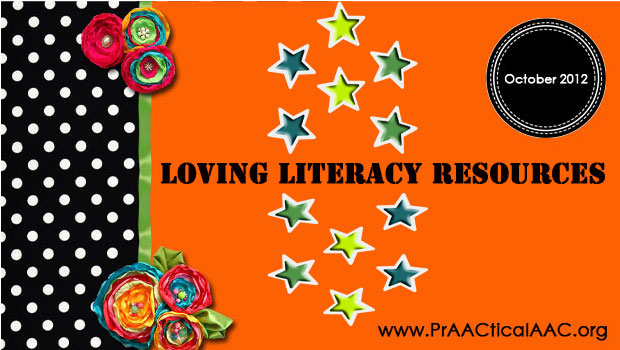
For AAC Awareness Month, we would be remiss if we did not think about literacy. It is a form of communication and language that supports AAC use. Sometimes literacy is difficult for our students, other times it is actually easier and it helps conversational communication and even natural speech. Either way, reading, writing, talking, and listening (understanding) are all modalities of language. There are so many great resource lists for supporting literacy: Jane Farrall’s Letter of the Week: Resources for Older Students, Spectronics Apps for Literacy Support, Melissa Taylor’s 24 Educational iPad Apps for Kids in Reading and Writing, and 25 Great Children’s Apps to Stimulate Literacy, Learning, & Creativity just to name a few. We wanted to share a few additional resources for literacy with general education apps that approach reading through fun with words. And any literacy discussion could not be complete without some seriously great literacy information, theory, and supports... [Read More...]
October 20, 2012
by Carole Zangari -
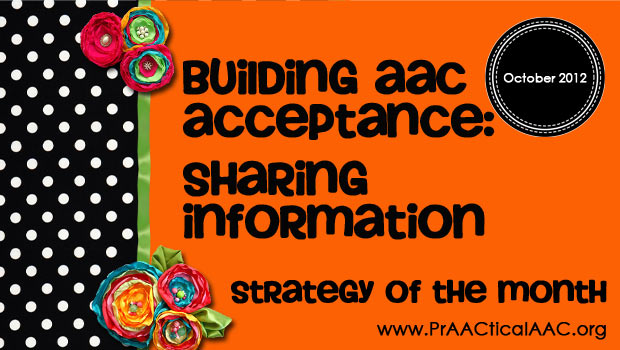
While there are certainly attitudinal barriers to AAC, it’s also true that sometimes the people we are trying to influence just need more information. Sounds simple, right? Not exactly. Especially when we consider these factors. Adult learners prefer to chart their own course to learning new things rather than have others lay that out for them. Our behaviors are most likely to change when we discover solutions for ourselves, as opposed to following directions that others give to us. We have a limited amount of time to guide others to the information they need. Here are some things that have worked for us. Develop a bank of educational materials that pertain to the topics that you face most often in your clinical work. Create resource files for general topics, such as the empirically-supported benefits of AAC, and specific topics, such as the evidence base for using SGDs with individuals who... [Read More...]
October 20, 2012
by Robin Parker -

Sometimes saying ‘no’ to the demands of the day actually helps us rejuvenate and allows us to be more productive. Saying ‘no to false information helps us to advocate for ourselves. The ‘no’ topic seems to be trending now. There have been quite a few blog posts and comments about the issue (Just Say No, How and When to Give Your Students A Break). We are so glad that this topic is getting more focus. Of course everyone agrees that ALL people have the right to say ‘no’. But it is not always so simple. There are many types of ‘no’. There is the outright ‘no’, the ‘no’ to more work, the ‘no’ for disagreement, the ultra important ‘NO’ to unwanted touching, and many more. And depending upon how you say ‘no’ is the difference between it being accepted or… NOT. The issue of saying ‘no’ gets more complicated when... [Read More...]
October 15, 2012
by Robin Parker -
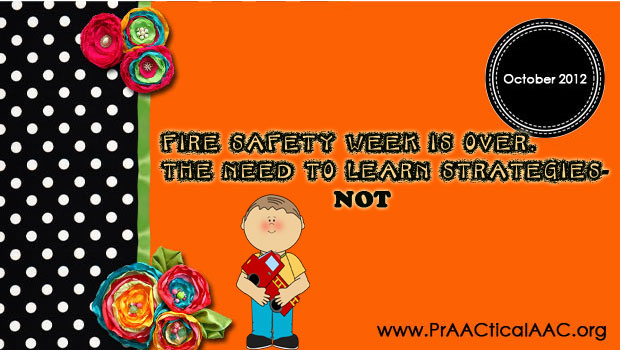
Fire Safety Week is over now but the need to learn fire safety strategies is NOT. If you missed these great fire safety resources, here they are to help you prepare for an fire emergency The 3 P’s to Keep Your Kid Safe During an Emergency Sensory Breaks & Learning Activities Firefighters are being Educated in Auburn On-Line Fire Safety Games for Kids How To Teach and Present Information, Lesson Plans, and Visual Supports for children and adults with Intellectual Disabilities For Teachers and SLPS Fire Rescue– an app for children that teaches the basics of fire safety through games, mazes, puzzles, matching, and more Apples 4 Teacher- kids fire prevention activities and information
October 8, 2012
by Carole Zangari -
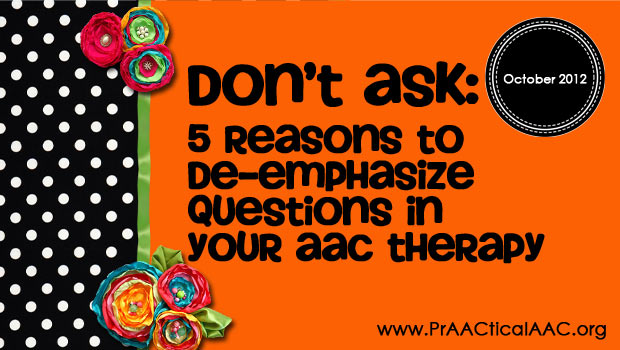
Questions are more like assessment than they are like instruction. Don’t believe us? Look at the questions these therapists posed and see if you didn’t feel like you were being quizzed. What’s your name? Where do you live? Do you know your address? How old are you? When’s your birthday? What school do you go to? What’s your teacher’s name? What’s that called? What do we do with that? Can you tell me more about it? Just to be clear, we think data-based decision-making always plays an important role in good therapy. However, assessment is assessment. Assessment helps us figure out what to teach and how to teach it. But it should look and sound very different than instruction. So when the SLP tells us she is going to teach a new skill by asking a question, we start to tense up. Here’s why we’re de-emphasizing questions in our AAC... [Read More...]









